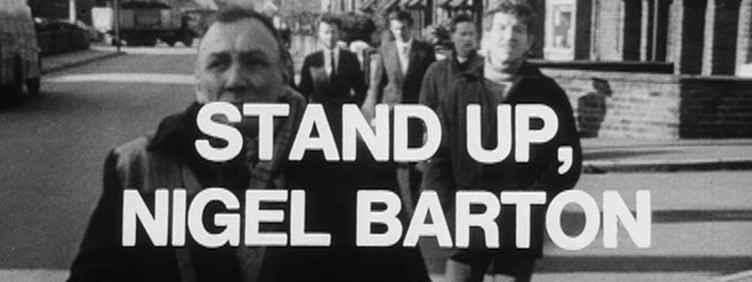
“Television brings us the Prime Minister, and a faith healer, a bleeding boxer and a sinking ship, a coronation and an assassination. The picture we see may have been thrown across the Atlantic or even off the moon: it can then seem a highly comic sort of activity to write Act One, Scene One, rehearse in a draughty Territorial Army drill-hall for a fortnight, remove the expletive ‘Christ!’ and finally sandwich yourself between Harold Wilson being frank and somebody walking in space.”
– Dennis Potter, Introduction to The Nigel Barton Plays
Much has been written about Dennis Potter’s two plays Stand Up, Nigel Barton and Vote, Vote, Vote for Nigel Barton, which aired in consecutive weeks on BBC1 as part of The Wednesday Play in December 1965. About their takes on class and politics; on how both are some of the most autobiographical works in the Potter canon; and how both plays point to themes present in Potter’s later work.
None of that is what I want to talk about here, however. Instead, I want to take a look at the Penguin paperback The Nigel Barton Plays, published two years later in 1967. This contains an excellent introduction by Potter, and scripts for both plays. Note the word “scripts”, there. They aren’t transcripts of the broadcast version of the plays. These contain numerous differences – in fact, they are the original scripts written by Potter, stage directions and all. Which means, by comparing the contents of the book to the final plays as broadcast, we can tell exactly what Potter originally intended to make it to air – and exactly how the rehearsal process changed things.
Spoiler: Potter wasn’t lying with his amusing anecdote about removing “the expletive ‘Christ!'”.
This article, then, is not a general analysis of Stand Up, Nigel Barton. Rather, it’s a look at exactly what changed between that script and the final programme. Of course, it can’t be a comprehensive list of all changes made to the show; that would be immensely tedious, and any good points would be lost in a sea of minor word changes and rephrases. I have, however, picked up on what I think are the most interesting differences – and I have tried to include every single change when it comes to profanity, as I think that’s the most important aspect of how Potter’s work was changed from script to screen.
While writing this piece, I have also had the pleasure of taking a look at pages of an actual copy of the script, as taken into rehearsals by Ian Fairbairn who was one of the children in the play. Aside from some different scene numbers, studying it gives confirmation that the text printed in The Nigel Barton Plays is the actual material taken into rehearsals. Many thanks to Andrew-Mark Thompson for his help here.
Let’s get going. Material from the book is styled like this, and dialogue from the show as broadcast is styled like this.
1 • Mining Village (0:00)
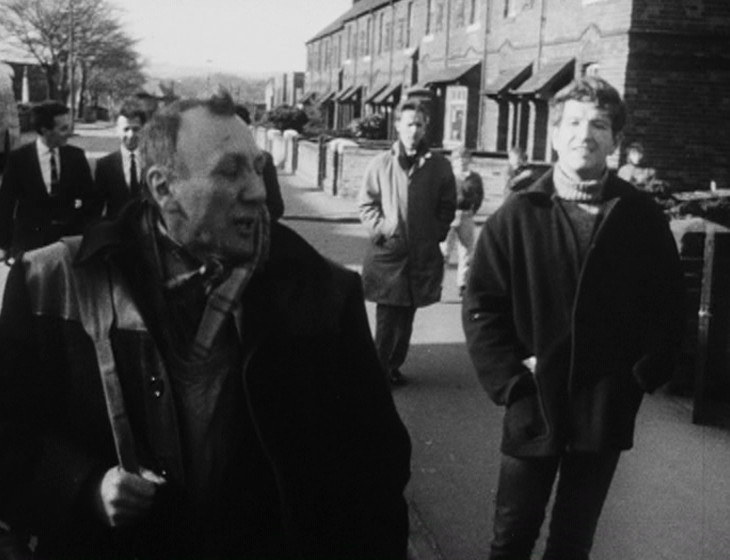
1) Our first change comes in the opening lines of the episode. When Nigel asks his father what the pavement’s for:
HARRY: For dogs to poop on, by the look of it!
HARRY: Dogs to mucky on, from looks of things!
“poop” seems a weird choice of word here in any case; a little too American.
Incidentally, the DVD subtitles gives the line here as “dogs to walk on, the like of things”. I will not be trusting anything the DVD subtitles say from this point onwards.
2) When Nigel presses the point:
HARRY: So do all the blokes round here.
HARRY: So do all the lads round here.
This is a blanket change across the whole script, regarding Harry and his friends; their many, many references to ‘bloke’ are all changed to ‘lad’ or similar in the broadcast version. (Nigel still uses bloke, mind.)
3) Moments later:
HARRY: Clever sod, ent ya? I expect they think the sun shines out of your bum down at Oxford.
HARRY: Clever sod, ent ya? I expect they think the sun shines out on ya down in Oxford.
4) An interesting stage direction in the script is changed here; when Harry asks “Why’s that then? Does bloody Oxford move up and down the bloody map?”, we get this:
They look at each other, questioningly, and then start to laugh.
In the version as broadcast, only Nigel laughs; Harry very much doesn’t. Which makes sense – Nigel and Harry go on a journey together throughout the play, albeit one which isn’t tied together neatly by the end. But if they can laugh at this together right at the start, then the journey is over before they’ve even started.
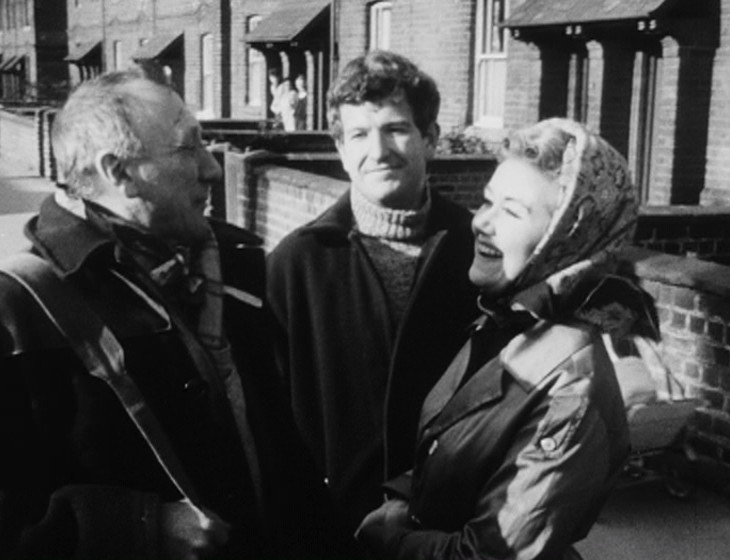
5) When that old busybody Mrs. Taylor jokes about Harry taking Nigel down the pit:
HARRY: Our Nigel’s got too much up top, thank Christ.
HARRY: Nay, our Nigel’s got his head screwed on right.
The very first blasphemous reference cut from the play, but certainly not the last.
6) When Harry realises he’s forgotten his towel:
HARRY: Blast and damn it! I’ve forgotten to change my work towel.
HARRY: Ecky bloody thump, I forgot to change me work towel.
7) This is followed by a line from Nigel present in the book but cut from the broadcast:
NIGEL: But good God alive–
Of all the things cut from these plays, it was perhaps predictable that blasphemous references would make up a hefty chunk.
8) Mrs Taylor’s graphic description of what happened to the unfortunate Jim Thomas:
MRS TAYLOR: Crushed by a great stone, butty. Flattened like a bloody black beetle.
MRS TAYLOR: Crushed by a great stone, love. Flattened like a bloody black beetle.
Again, the word “butty” – meaning “friend” – is present throughout the entire script, but every single reference is replaced in the broadcast play with ‘love’, ‘lad’, ‘boy’, etc.
At this point, perhaps the following from W. Stephen Gilbert’s The Life and Work of Dennis Potter may be instructive (p. 126):
“In the published text, the rhythms and expressions of the mining village are clearly those of the Forest of Dean (‘butty’, ‘ol’un’ and so on) but Potter says unconvincingly in his opening stage direction that the play is set in ‘probably South Nottinghamshire’. This is a rationalisation of the fact that all the village scenes were shot in the village of Bestwood and in the telerecording the language becomes a generalised north country (‘ecky bloody thump’).”
This is, indeed, entirely true. Harry’s dialogue is almost completely rewritten at times in this manner.
9) As Nigel continues arguing with his father:
NIGEL: You know damn well I didn’t mean anything like that!
NIGEL: You know very well I didn’t mean anything like that!
10) …but as if to retain a little bite in the script, the very next line is actually stronger in the TV version:
HARRY: Shove off!
HARRY: Ah, sod off!
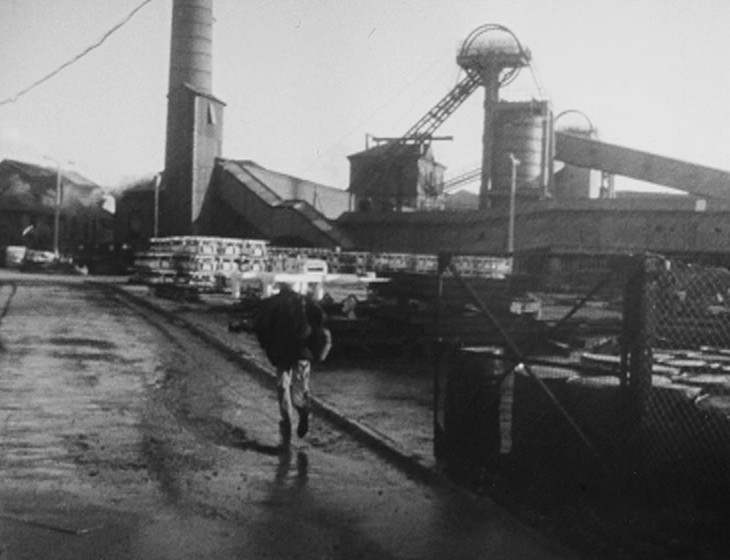
11) When Nigel goes to shelter from the rain, the script mentions he does so in a “fish and chip shop”; in the final programme, he does so next to a very generic wall. More vividly, the script mentions a “huge steaming slag heap, looming out of veils of rain”; the show as transmitted has no such thing – instead, just a normal-looking coal mine.
You do what your location allows, of course, but the huge steaming slag heap would have been a striking visual.
2 • Classroom: Day (4:18)
12) As Miss Tillings finishes her famous “I say nothing controversial”, the script informs us that:
As she finishes speaking her face dissolves into a wavery-lined mix to the bust of Harold Macmillan in the Oxford Union”.
As broadcast, we get a straightforward mix instead, with no wavy lines in sight. Whether this was for a technical or artistic reason it’s impossible to say, but I think a wibbly effect would have over-egged the pudding a tad.
13) Another difference regarding this sequence; as well as cutting to different busts as the bell strikes eight o’clock, the script tells us we are supposed to see Nigel “in dinner-jacket alone in Union” [sic]. As broadcast, we get two separate shots: Nigel still in the classroom, and then Nigel in his dinner jacket – and more importantly, his mortar board – in the Union. This is the first time the actual storytelling has been altered from the script beyond changing a few words, and this addition to the final version has more resonance than the original script, linking together the two eras of his schooling far more clearly.
3 • Nigel Barton’s Bedroom (5:34)
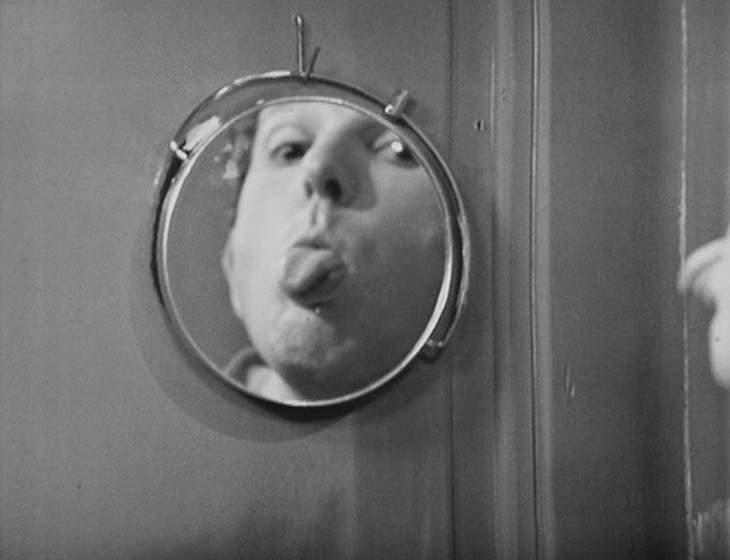
14) This entire sequence is pretty much as scripted… bar one addition. After Nigel’s “Don’t worry folks! You’re paying for it!”, his marvellous sticking-out tongue in the mirror is never mentioned in the script.
For me, this is one of the most memorable images in the whole play.
4 • Classroom (7:30)
15) As Nigel’s classmates appear, the script details that the “screen dims down and then dips up”; as broadcast. the children appear with a violent cut. It may have been cleaner if they’d done it as scripted, but the end result has far more impact.
5 • Classroom: Day (8:09)
16) Scene 5 is pretty much identical on script and broadcast, although I do have to share this marvellous shot of Ian Fairbairn’s copy of the script1:
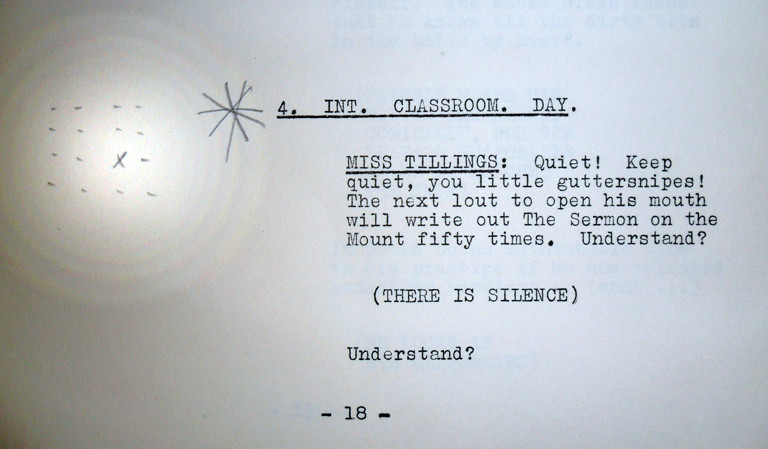
A little diagram showing where he’s sitting in the scene!
6 • An Oxford Party: Night (10:01)
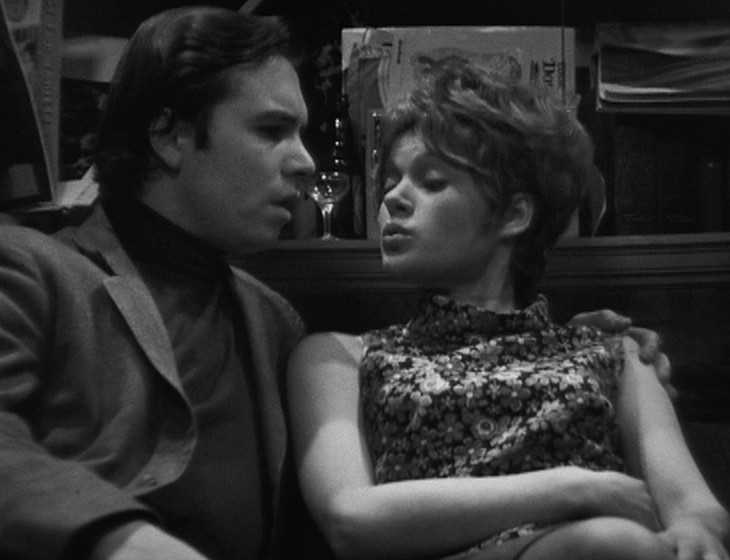
17) Moving onto the party, and we have what I think is a cut, though it isn’t immediately obvious:
Open with boy and girl in some sort of intimate juxtaposition which echoes the closing words of Scene 5, the reading from the Bible.
TIM: Come on, Jill! You don’t really want to stay…
Seeing as the last scene ended with Pringle talking about “the teats of their virginity”, it’s a struggle to say Tim merely with his arm around Jill quite gets the link across that Potter was going for here.
18) Hey, anyone up for learning a character name which isn’t in the published version of the script? Scrawled on the script, the character simply named ‘Undergraduate’ is given the name Cedric:
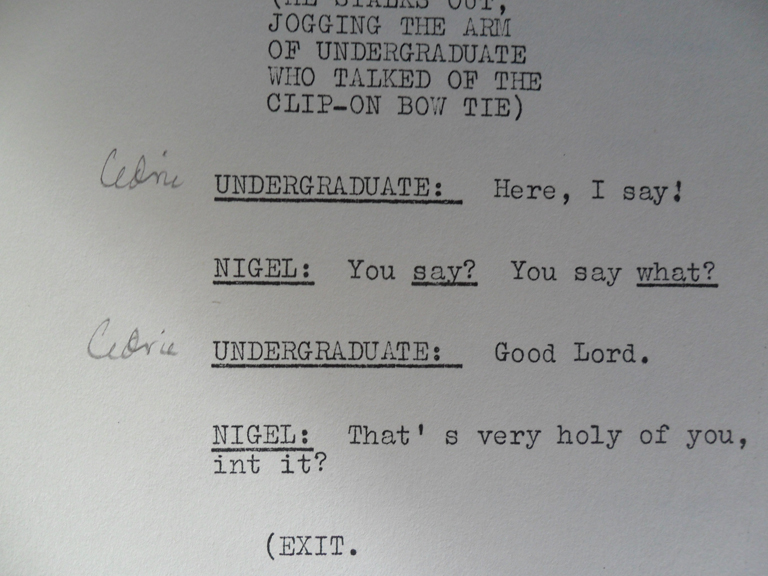
19) A unusual example of dialogue being made stronger in the final play than in the script, from another random undergraduate:
FACE ONE: One leg over the wall and the other leg dangling in mid-air. Just my flippin’ luck to be caught in the rain.
FACE ONE: One leg over the wall and the other leg completely stuck in mid-air. Just my bloody luck to be caught in the rain.
The rest of this scene proceeds pretty much as scripted. Potter very specifically calls this scene out as problematic in his introduction to The Nigel Barton Plays:
“Boldness and imagination, however, did not exactly distinguish certain of the Oxford sequences in Stand Up, Nigel Barton. The ‘home’ and school scenes were so important to me, and so vital in establishing the nature of the piece, that there was not – in the time available – enough left to put into some of the Oxford scenes… Time and time again production decisions are taken which, almost haphazardly, can cripple a particular scene or sequence in a play: even so, the responsibility for the stilted and pointlessly over-mannered party scene in Stand Up, Nigel Barton was, of course, mine. Oxford undergraduates do not talk like this, even when drunk or high.”
What Potter is talking about here seems to be borne out by my script comparison: in general, the home scenes seem to have more differences from the script than the Oxford scenes. The likely explanation, and one which fits with Potter’s complaint above, is that the home scenes – by necessity – were given far more rehearsal time than the Oxford material.
7 • Classroom: Day (15:18)
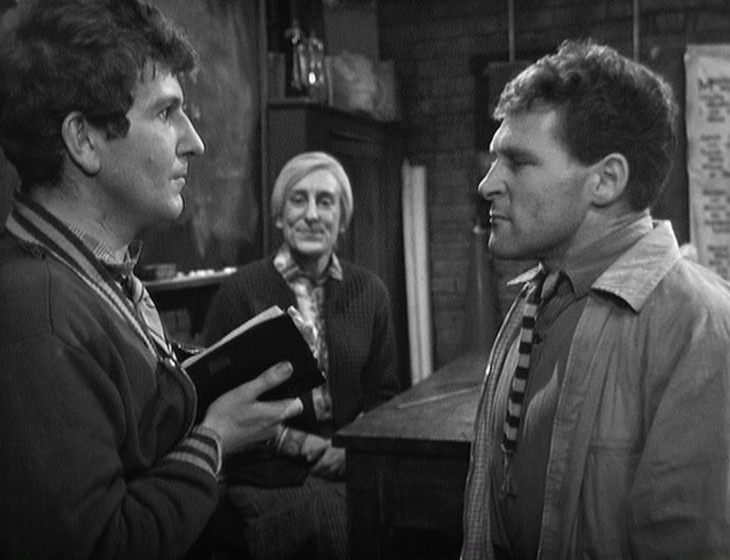
20) When poor old Georgie Pringle returns, Miss Tillings’ line to him is slightly different:
MISS TILLINGS: Oh, go and sit down, you fool.
MISS TILLINGS: Oh, stop snivelling, you idiot.
This appears to be so when Nigel does his own reading of the Bible – “blessed are those who are persecuted for righteousness’ sake” – Georgie can still be standing in front of Nigel and get the full force of his meaning. Miss Tillings then says “Sit down, Pringle” – a line not in the script.
21) An extra bit of business right at the end of the scene in the broadcast version which isn’t in the script: Bert throws something at Nigel, and then we sharply cut to the next scene. The script suggests pretty much the entire opposite: a “very slow mix to scene”.
22) Interestingly enough, the script doesn’t say exactly which music is to be used; in the final play, it’s Wilson Pickett’s In The Midnight Hour. Considering how specific Potter is about music – indeed, with his use of We Gotta Get out of This Place later in the play – it’s perhaps curious he didn’t specify a song here.
8 • Nigel Barton’s Room at Oxford: Afternoon (18:01)
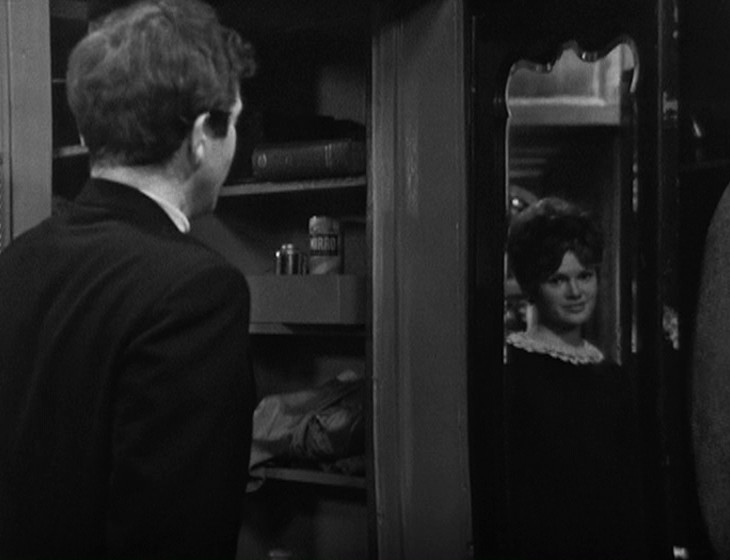
23) Jill’s entrance into Nigel’s room is done a little differently in the script compared to the broadcast version. In the script, she knocks, Nigel pulls off his jacket, she knocks again, impatiently – and he tells her to come in. On-screen, all this is gone entirely: she merely walks into his room. This probably fits her character better, but it does mean we lose this delightful visual described in the script:
Enter JILL. She shuts the door and stands with her back against it, as though a target in a knife-throwing act.
24) Also worth noting: in two places in the script, Jill is said to “laugh harshly” before her line “I’m young! I’m beautiful!”, and giggle after she mentions tranquillisers. Vickery Turner disobeys both instructions, and probably for the good.
9 • The Barton Home (22:52)
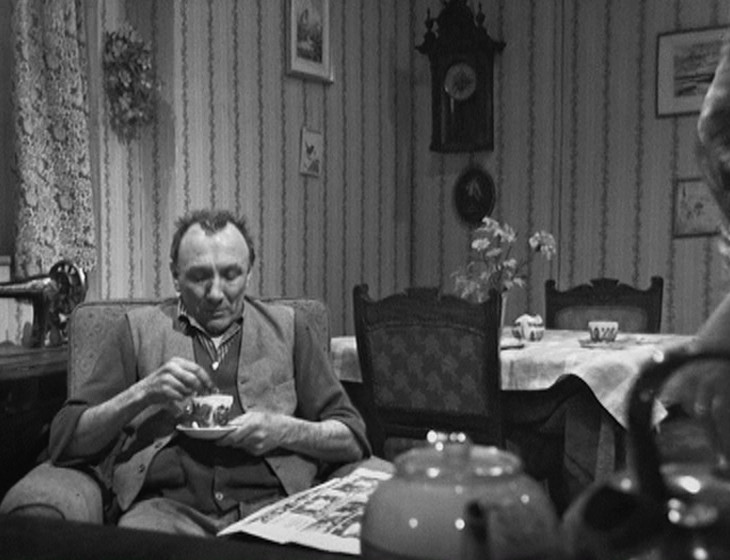
25) When Mrs. Barton2 tells Harry that he used to be “so proud of our Nigel”, the broadcast version has Harry muttering under his breath. The script is rather more direct:
HARRY: For Christ’s sake!
26) An interesting change of phrasing:
HARRY: Anybody’d think Oxford was the be-all and end-all of existence.
HARRY: Anybody’d think Oxford was the be-all and end-all of life.
The broadcast version is surely better; would Harry really use the word “existence”?
27) On a similar note, the following change also seems rather more Harry:
HARRY: There was no Oxford any road. We’d a been certified if we’d so much as thought of the place.
HARRY: Not no Oxford any road. They’d have sent us to loony bin if we’d so much as thought on it.
28) In fact, as a whole, this scene feels a lot more refined on the screen than in the script; the requests for tea and the horse racing on the telly are nowhere to be seen, which feel like important parts of the Barton household. I’ve given a couple of good examples above, but much of Harry’s dialogue is tweaked for the better. This really does feel like a key scene which the production have spent a lot of time on; again, this fits in perfectly with Potter’s point about spending more time on the home scenes than those set in Oxford.
10 • School Play-Yard (28:03)
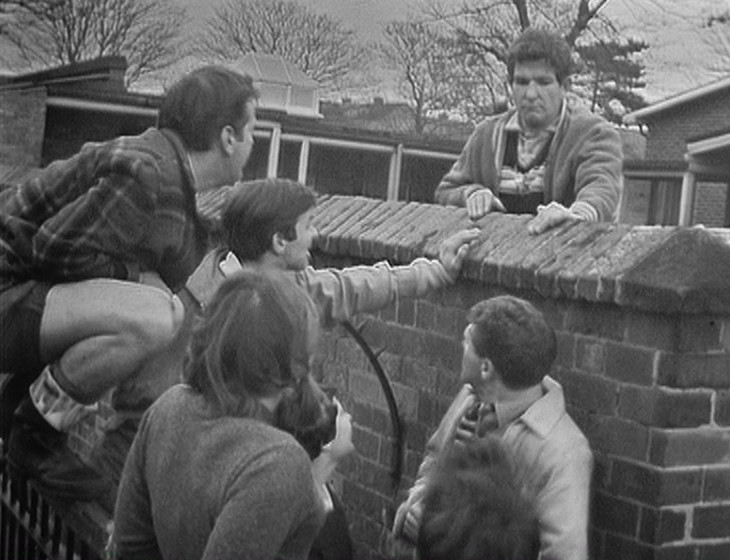
29) As scripted, Nigel’s entrance is entirely different to the final version:
A cluster of delighted boys round a beaming GEORGIE PRINGLE. NIGEL stands a little apart, very cautious.
As broadcast, Nigel pops up from behind the wall halfway through the scene. (Which, to be fair, feels a little odd to me. I don’t think they ever quite sold how to get Nigel into the scene effectively.)
30) An unusual bowdlerisation, with Pringle talking about his visit with the headmaster:
PRINGLE: He couldn’t do nothing. My dad’d break his bloody neck for him.
PRINGLE: He wouldn’t touch me. Me old man would wring his ruddy neck for him.
The word ‘bloody’ wasn’t changed anywhere else in the play, and is used liberally elsewhere. Were they worried about having schoolkids using the word, even if it’s schoolkids portrayed by adults? Not that they had a problem with our hero using “bastards” at the end of the scene, mind…
Ian Fairbairn’s rehearsal script has some interesting scrawls on it here:
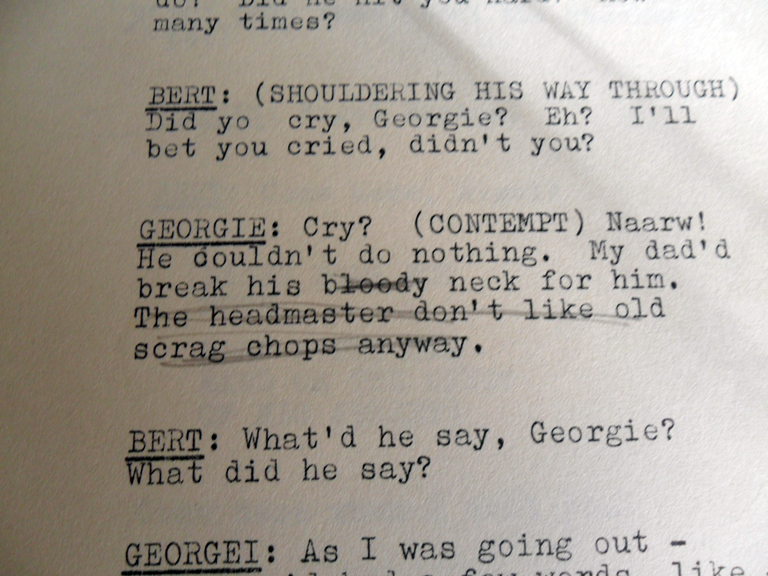
So “bloody” is indeed crossed out, although the “ruddy” hasn’t been added as a replacement yet. More interestingly, the “scrag-chops” line has been crossed out… yet is actually present in the final broadcast version of the scene!
31) While we’re talking about Ian’s rehearsal script, how the dialogue is split between some of the kids changed during rehearsal:
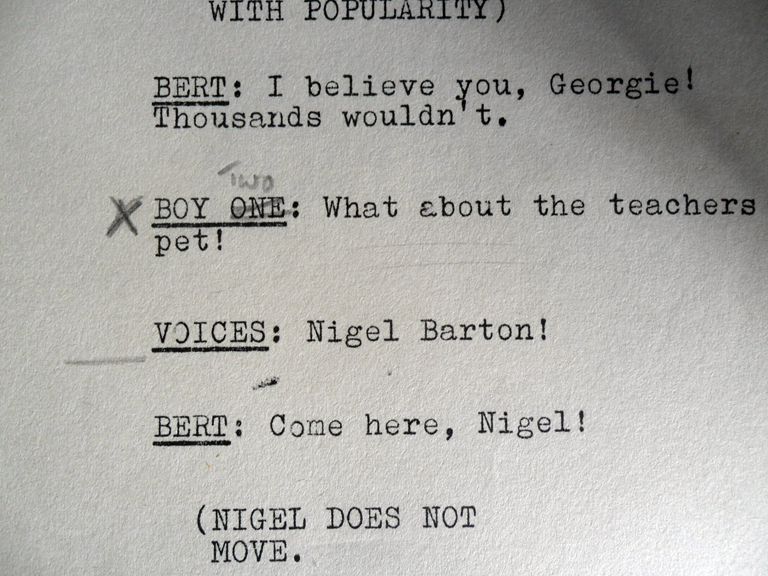
The published script in The Nigel Barton Plays retains the original assignations, confirming that the published script really is the script they took into rehearsals, not what they took out.
32) A fair amount of the dialogue in this scene is rewritten and put into a different order, although the general beats are the same. I guess with the scene being as action-packed as Nigel Barton gets, the rehearsal process brought about a lot of changes to make it work on-screen. There is, however, one more specific bit of dialogue in the script which didn’t make it to the final version which I’d like to highlight:
BERT: Rotten little bugger.
This reminds me very strongly of the following, from the behind-the-scenes book on Spitting Image book, Tooth & Claw (p. 72)3:
“A great bastard/bugger debate developed between [Stephen Murphy, IBA Programme Officer] and [John Whitney, Director General of the IBA] which seemed incapable of resolution. Light only dawned when they realized they were looking at the words from different regional perspectives. ‘Bugger’ is a term of affection in the North (where Murphy came from) whereas ‘bastard’ is rarely nice. In the South it tends to be the other way around. It was nice to have it sorted, but not an enormous help in arriving at judgements for national network transmission.”
It is perhaps notable that despite the play being set up North, the single use of the word “bugger” doesn’t survive, but multiple “bastards” do.
33) At the end of the scene, the script says:
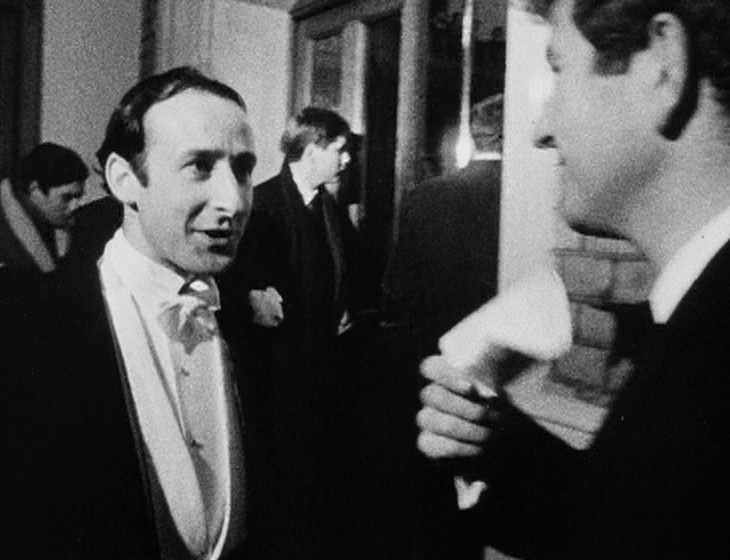
MIX TELECINE: laughing faces at the Oxford Union Debating Chamber, pieced together from cutaways of various Union debates. END TELECINE.
From here, we go straight into Nigel’s speech at the Union.
As seen on-screen, this sequence is a little more involved. We first see Nigel standing in the empty Union chamber, looking at the busts referenced earlier. We then have an extra piece of location shooting, mentioned nowhere in the script, where the President greets Nigel at the door of the Union:
PRESIDENT: Ah Nigel, going to dazzle us tonight? Let’s come right in.
It’s particularly interesting here to see a situation where the production has ended up being more ambitious than the script.
11 • The Oxford Union – At the Despatch Box: Night (31:45)
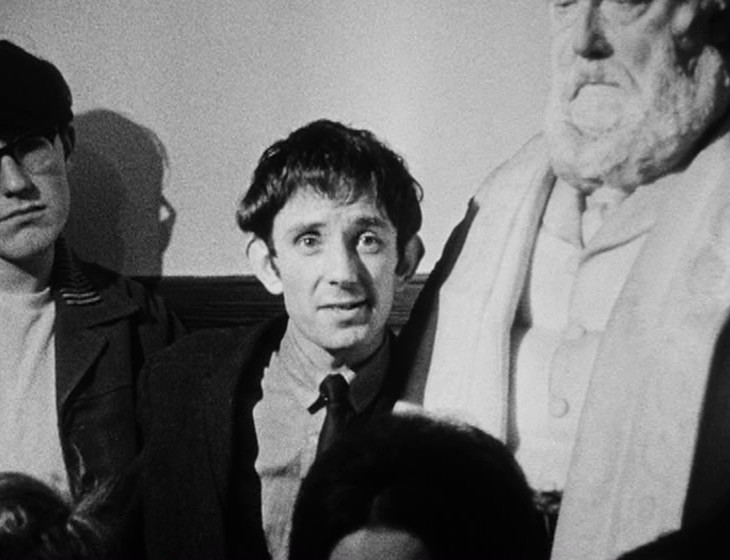
34) In the script, the character who calls Nigel’s palate “as primitive as his politics”, and shouts “Shame!” when Nigel requests some serious argument, is simply credited as ‘Voice’ in the script. In the final play, we see the character on-screen. This seems a bit of an odd directorial decision – Nigel’s “There speaks the eternal voice of Oxford” speech would be especially effective if he was deriding an actual, ethereal voice.
35) Nigel’s reference of debating “That we should not fight for King and Country” in the script has changed to “Queen and Country” on-screen. This changes the reference from a historical reference to a specific, famous debate from 1933, into a more contemporary potential debate.
36) Nigel’s response to the President’s lame joke about camels was originally more forceful:
NIGEL: Oh, for God’s sake.
NIGEL: Oh my [he mouths the word ‘God’].
It looks suspiciously like ‘God’ was actually said in the original performance, and then mixed off the soundtrack deliberately.
37) After Nigel queries whether it’s true that “class no longer matters in Britain”, there are a couple of extra lines in the TV version:
VOICE: Well it don’t!
NIGEL: Just listen.
38) An extra line at the end of the scene which is present in the script only:
NIGEL: But I do not see how we can debate such a question as Class without expressing it in personal terms.
[Groans of derison]
This line makes a little more sense of the rest the Nigel’s speech when we cut back to the Oxford Union later on: particularly the line “and this is what I mean by the personal element”.
12 • Working Men’s Club (34:26)
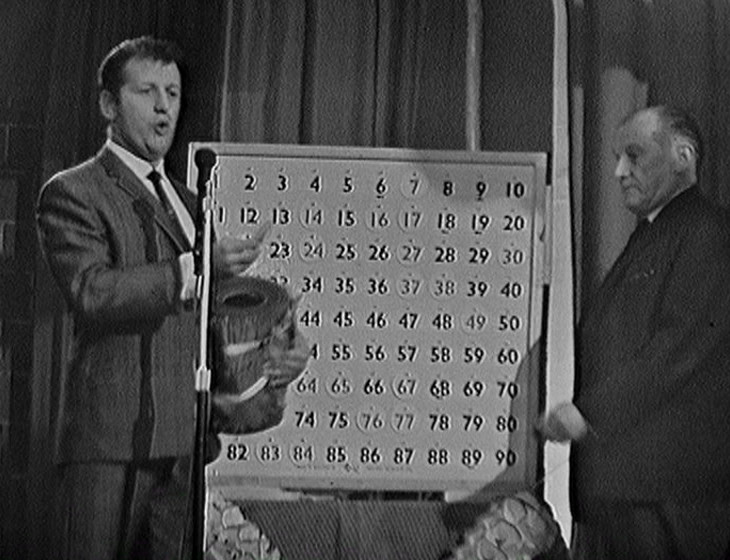
39) A section of the script entirely cut for the broadcast:
BERT: Alright, ladies and gentlemen. Ladies and gentlemen! Come on, let’s have a bit of order!
HARRY: That bloke do like the sound of his own voice.
BERT: Now we can have an hour of ent-er-tainment, ladies and gentlemen, with Mrs Green at the piano.
[Applause]
JORDAN: Oh, he saw me, alright. Must have!
HARRY: What?
JORDAN: Your Nigel.
HARRY [testily]: I don’t expect him did, Bill.
JORDAN: No? Oh, well, there it is. Must be me in the wrong. Must be.
BERT: Mrs Green will begin with ‘In a Monastery Garden’. And then we can have some ar-tistes up here. Ladies and gentlemen. Let’s have some order please!
VOICES: Order! Order!
HARRY: Our Nigel’ll always speak. He’s not big-headed, Bill.
JORDAN: Him ant got nothing to be big-headed about!
[Piano: ‘In a Monastery Garden’ – Ketelby]
HARRY [hostile]: What be you on about?
JORDAN: No offence, Harry o’but. No offence.
This is generally a good cut; most of the beats of this exchange are more than replicated elsewhere in the scene, and the scene is more effective without tensions rising to the surface quite so forcefully. I do miss the “Order, order!” chants from the audience, though: surely a deliberate parallel with the previous Oxford Union scene?
40) As Nigel enters the club and passes the man at the fruit machine, we get a little extra piece of dialogue in the final play which is missing from the script:
NIGEL: On a hiding to nothing.
MAN: Aye.
It’s a small moment, but it immediately paints Nigel as comfortable in the surroundings of the Working Men’s Club – at least, until Bill Jordan gets his oar in – in a way that the script doesn’t.
41) An interesting change when Harry tells Nigel to talk to Bill, as he’s a “bit sensitive”:
NIGEL: What’s that got to do with me?
NIGEL: Couldn’t care less.
It’s not much of a change in itself, but Nigel repeats the phrase “couldn’t care less” seconds later, when Harry presses the point. The transmitted version portrays Nigel as harsher and more irascible.
14 • Working Men’s Club (41:49)
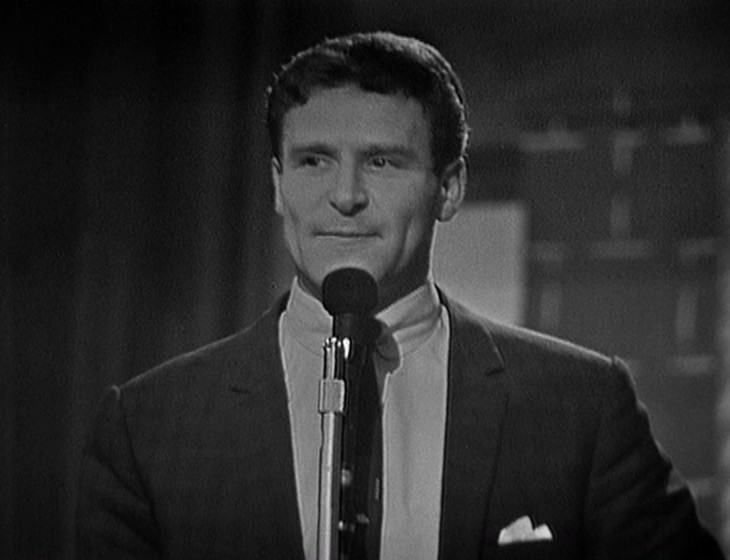
42) Scene 13 at the Oxford Union is virtually as scripted. Back to the Working Men’s Club, and Georgie Pringle is up on stage:
PRINGLE: Research! If you ask me he couldn’t tell his arse from his elbow.
PRINGLE: Research! If you ask me he couldn’t tell his… pen from his pencil.
I like this example especially, as it’s just a quiet example of how the script had a few of the edges shorn off when it comes to the language. In this case, however, the censorship actually adds an amusing joke.
43) A section of Pringles BIG JOKE is cut from the final version:
PRINGLE: ‘Hellow, sonny’, says this here researcher, ‘is your dad in?’ ‘He was in here a bit ago,’ says this nipper, ‘but he went out when our Mam came in.’ ‘Oh. Can I speak to your mother then, sonny.’ ‘She was in here,’ says the little boy, ‘but she went out when our Aunt Dolly came in.’ Funny, thought the bloke. Funny! ‘Well is your Aunt Dolly in then?’ he says. ‘She was in here not long ago,’ chirps the nipper, ‘but she went out when our Uncle Fred came in!’ This here University Student scratched his head a bit. ‘Well then, sonny, is your Uncle Fred in?’ ‘Our Uncle Fred was in here a minute ago,’ says the boy, getting a bit fed up wi’ all this, ‘but he went out when I came in!’
This might have been a good cut for pacing, but the logic of the joke is kinda ruined in the broadcast version. But that’s far from the worst crime when it comes to this scene…
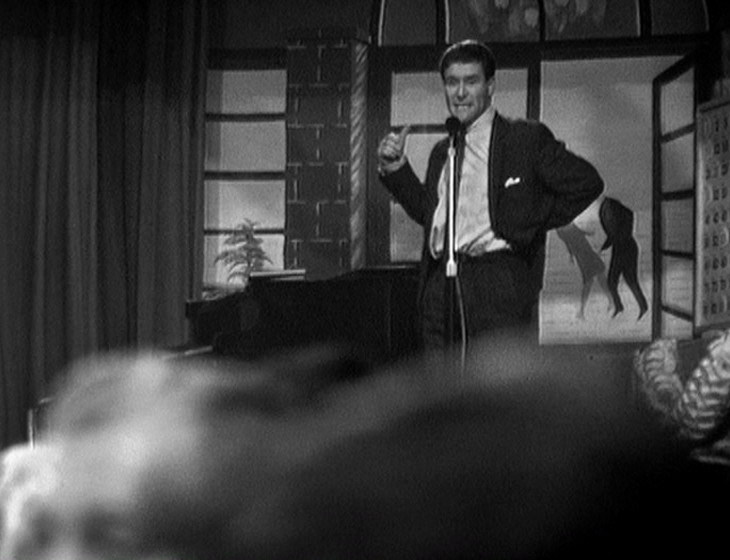
44) Yes folks. This is a big one. In my view, the single most important change made to the whole programme between script and screen. And it’s the climax of Pringle’s joke:
PRINGLE: This ent our house! Our house is up the garden. This is the shit house!”
In the final edit, we awkwardly cut to a shot of Ernie laughing for the duration of the words. Not a trace of it remains on the soundtrack either.
Now, it’s not exactly difficult to see why this was cut. (As far as I can ascertain, it would have been the first time the word “shit” had been used on British television, at least in a scripted programme.) Unfortunately, it’s also badly damages the scene. All the removals for language so far in the play may have dulled some of the impact of the piece, but the meaning was always clear. Here, the censorship actively interferes with the joke, and the entire point of the scene. Clearly, unlike with some of the language substitutions, the production thought they would try and get away with the language rather than replace it before shooting; clearly, they lost the fight, and the result is a scene which really loses something vital.
Oh, and the DVD subtitles seem to think that the word is “greenhouse”. Which is the final insult, decades later.
Incidentally, this scene contains the only difference in dialogue I’ve managed to find between Ian Fairbairn’s rehearsal script, and the printed version in The Nigel Barton Plays The rehearsal script has… this:
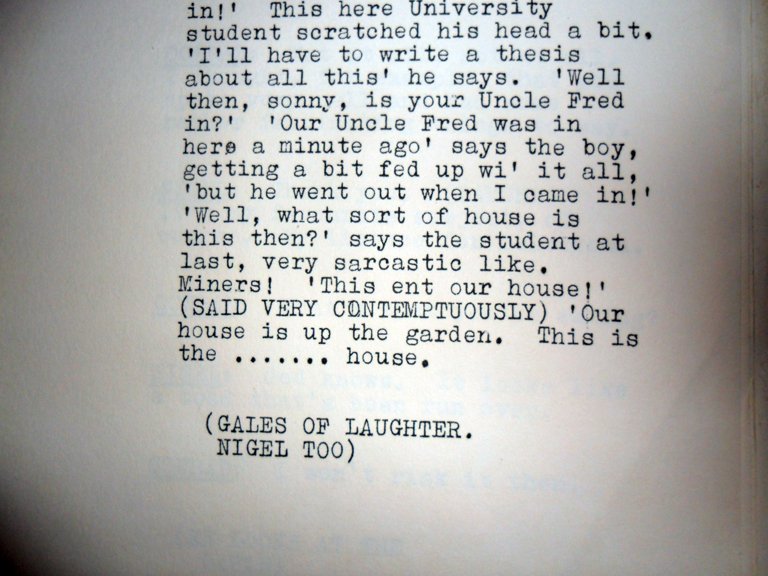
My final act of scholarly analysis here is: pffft, *shrug*.
45) One final thing about this scene; in the reaction to the joke, we’re told there is:
Gales of laughter. NIGEL too.
We never see Nigel laughing at the joke in the finished play… which I think makes sense. For him to laugh at it would be to show he’s more comfortable with himself than he actually is.
15 • The President’s Office (43:52)
46) Peculiarly, this scene is bookended with additional dialogue on the final broadcast which isn’t in the script, while the main part of the scene is virtually identical. At the start:
CONRAD: I’d like to get him on the programme.
PRESIDENT: I’m sure he’d be rather glad of the money!
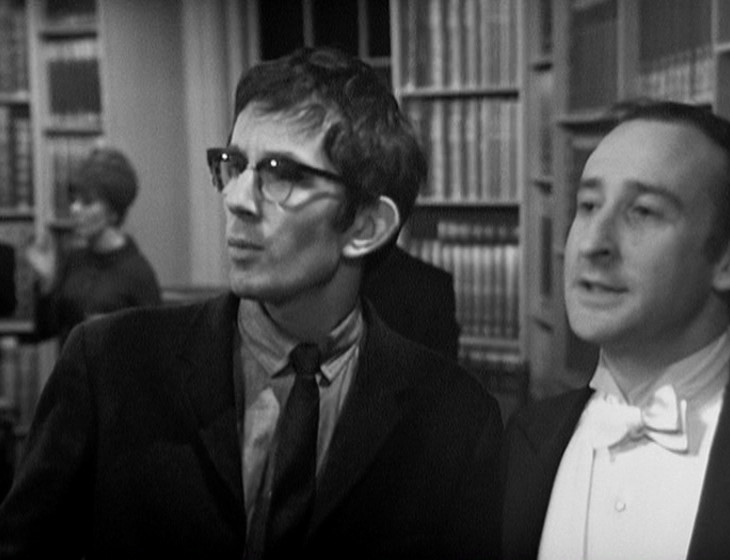
47) And finally, at the end:
PRESIDENT: That dinner jacket really suits Nigel frightfully well.
UNDERGRADUATE: I wonder where he hired it?
Interestingly enough, both these additions emphasise Nigel’s financial situation, which is rarely touched on directly elsewhere in the play.
16 • The Working Men’s Club (45:42)
48) Unusually, the front half of this scene had been entirely reworked by the time it reached the screen. Let’s take a look at the script first:
ALL: ‘I will cling to the Old Rugged Cross – Rugged Cross, And exchange it some day for a crown!’
[Somehow, during this, NIGEL must contrive to seem both part of this peculiar ritual and yet a detached, slightly amused observer, aware of the complexities of his position.
A drunk staggers on to platform amid hoots and applause.]HARRY: Good old Ernie!
JORDAN: Him’s as soft as a fresh egg, Harry. Had a doughnut in the canteen last week. ”Ere’ he says, all indignant like, ‘there’s no jam in these ‘ere doughnut!’ No! [cackles] It was all down his bloody shirt!
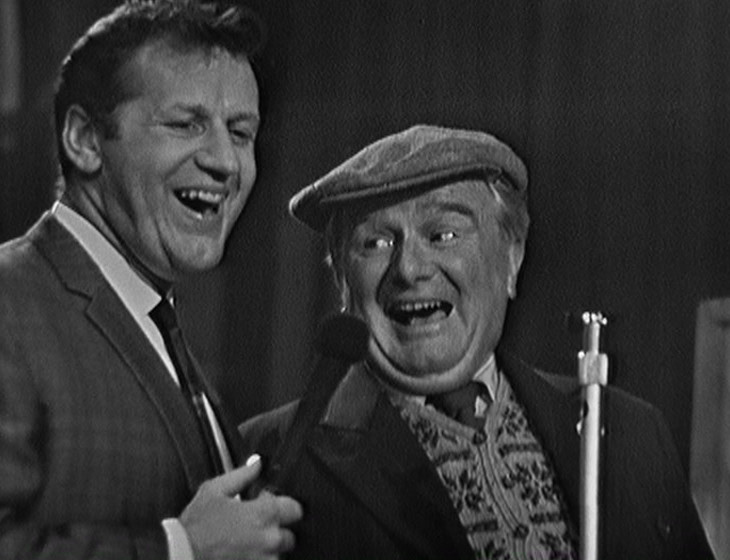
As broadcast, the scene doesn’t focus on Nigel/Harry/Jordan at the beginning. Instead, we get this little vignette with, erm, Bert and Ernie, as Ernie staggers up onto the stage:
BERT: Keep your head up, Ernie. Keep it up. Keep your head up, lad. You might spill some. You’re going to give us a number, aren’t you?
ERNIE: Aye.
BERT: And we all know what it is, don’t we?
ERNIE: Aye.
BERT: I bet I can guess what it is, can’t I?
ERNIE: Aye.
BERT: ‘Sixteen Tons’, isn’t it?
ERNIE: Aye!
BERT: Give him a big hand!
From here, the scene proceeds as originally scripted.
This perhaps seems a bit of an odd amendment; why change things to spend so long with Ernie, who isn’t that relevant to the plot? Still, it adds a little bit of colour to the club, and the original dialogue for Jordan seems a little out-of-character – just a little too friendly.
It also has to be said that the original stage direction for Nigel – “who must contrive to seem both part of this peculiar ritual and yet a detached, slightly amused observer, aware of the complexities of his position” – feels like a difficult thing to actually get across to the audience. A useful character note for informing performance, but it’s perhaps not surprising we didn’t get a lingering shot of Keith Barron trying to portray it.
49) At the end of the scene, after Jordan gets one final swipe in at Nigel (“Ent it good enough for you now, then?”), the stage direction notes that Jordan chuckles malignantly. On broadcast he doesn’t, which fits in with the excision above – he ended up with a drier personality than in the script. (Although the main reason I mention this is because I want to quote the line “chuckles malignantly”, which is a lovely description.)
17 • Oxford – The Proctor’s Office (47:10)
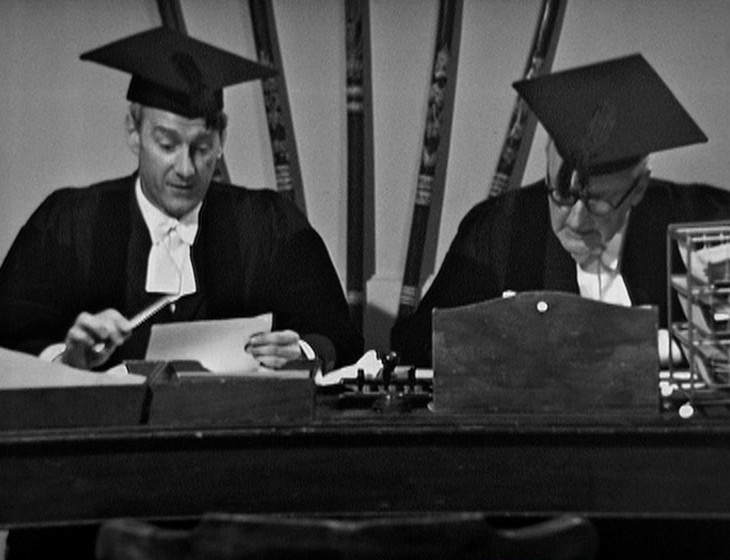
50) The script reveals the extremely amusing false name which Nigel gave when asked to leave the premises of the King’s Arms:
JUNIOR PROCTOR: And giving a false name to the University bulldogs.
SENIOR PROCTOR: Rollocks, he said.
JUNIOR PROCTOR: Rollocks [sniff] of Jesus.
File that one under “come on, Dennis, how did you ever think you’d get away with that one?”
Incidentally, this scene says that Nigel’s misdemeanour occured on “Tuesday, January the 23rd”. Which means that the “present day” scenes in the play must have taken place in early 1962 – nearly four years before the play was broadcast. Which makes sense – after all, Stand Up, Nigel Barton is supposed to be a prequel to Vote, Vote, Vote the following week. This is clearly the best piece of research anybody has ever done on anything related to Dennis Potter.
18 • The Classroom: Day (49:18)
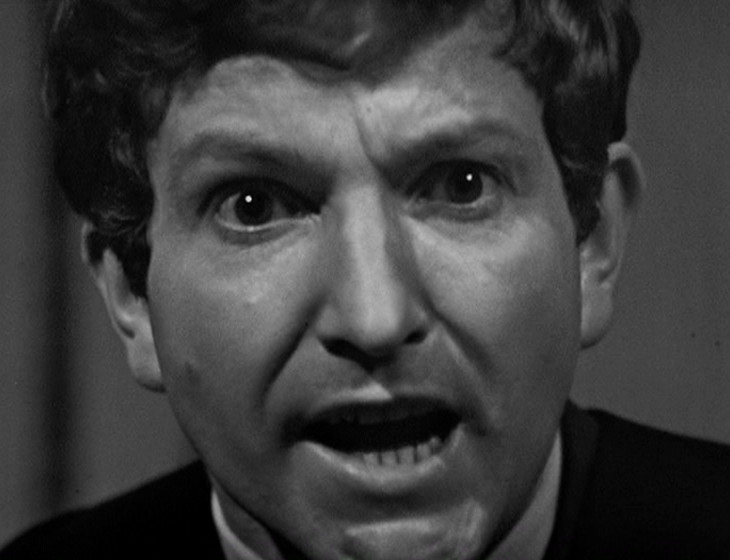
51) A very interesting little amendment to the beginning of the scene where Nigel frets about destroying the flowers:
NIGEL: I don’t know what our Mam will say. Oh, my God!
NIGEL: God knows what our mam will say. Oh, my God!
Considering a large number of the amendments up until this point have been to remove blasphemy – including in the very previous scene – it’s interesting that one has been added here!
52) Again, at the end of his speech:
NIGEL: God knows what she’ll do.
NIGEL: And God knows what she’ll do. Oh my God!
Though it is perhaps notable that with both of these lines, Nigel immediately launches into the Lord’s Prayer. Perhaps it was seen as more justifiable with this context?
20 • Nigel’s Room at Oxford (53:08)
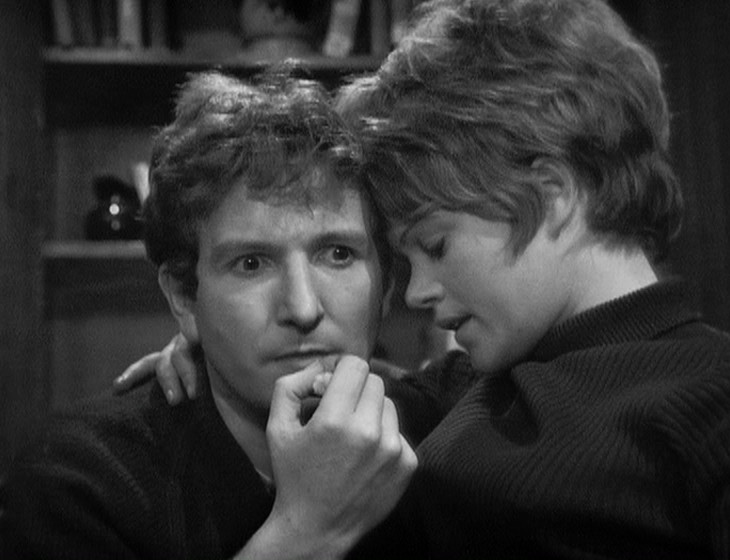
53) The subsequent classroom scene has no changes of note, but come the next scene we hit something very unusual indeed for this play. The entire first half of the scene is cut from the broadcast version, but is preserved in the script:
NIGEL: I was almost seismographically accurate in that TV interview, Jill. Horribly truthful. But all the time – I don’t mind you knowing about it, darling, but only you – all the time I was – well, sort of calculating.
JILL: [smiling]: You don’t say!
NIGEL: Am I that sort of person, then?
JILL: Most of the time. It’s built in.
NIGEL: You make me sound like some sort of cripple. I always thought that I gave the impression of being – extraordinarily – sincere.
JILL: Oh, darling!
NIGEL: I used to tell lies at school and get off scot free. I found it gave me – a sort of – power. Words could be manipulated. You could defend yourself. Take control of events, instead of being chopped up into little pieces of raw flesh. [Morosely] I ought to become a politician, I suppose.
JILL: Don’t worry, my love. You will. You won’t be able to help yourself.
NIGEL: Isn’t that horrible? Isn’t that really horrible? [Glumly] There’s no such animal as a politican who’s also a decent human being. Every intelligent person knows that. Correction: every intelligent working-class person knows it. He can look at his house, his schools, his clocking-in card, his bingo, and his old-age pension and know that something is wrong, something is rotten, just as surely as the old miners knew it when the timber in the pit props creaked in a certain way. Oh God, there I go again. Listening to myself.
JILL: Still, it’s a nice sound. I like it. [She kisses him.] You mustn’t have a conscience about these things. The kind of nobs who have always been in power knew very well what life as all about. And how to fix it.
I don’t think the play loses a huge amount for the removal of this exchange. The overt parallel between Nigel telling lies at school and his calculated performance in his television interview is lost, but perhaps is even more effective as subtext in the final version.
Where it becomes more interesting is in the removal of the lines about politics: we’ll come onto it in the next article, but it is widely known that Vote, Vote, Vote for Nigel Barton was rewritten after it was shot as the BBC was nervous about the political content. (Potter, in his introduction to The Nigel Barton Plays: “I was asked by one chief B.B.C. executive whether or not I was ‘some kind of fascist'”.)
The question is, then: was the removal of this section purely down to time, or did the BBC want to tone down the political content of this play when they were already nervous about the next one?
23 • Nigel’s Room at Oxford: Night (59:53)
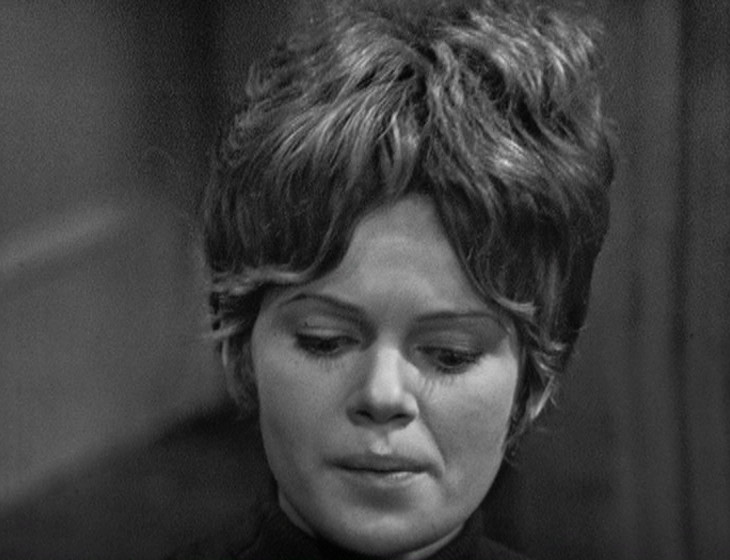
54) The two scenes where the reporter visits Nigel’s house run pretty much as-scripted – a bit of re-wording here and there, but nothing major. We then cut back to Nigel and Jill, and another portion of removed dialogue at the beginning of the scene:
JILL: If what you’ve just told me is really all you said in that interview, I don’t see what you’re worried about.
NIGEL: Honestly?
JILL: Honestly. You said that it would be hypocritical to talk about ‘social mobility’ or whatever without coming down to actual examples, real people, genuine situations. Fair enough.
NIGEL: Yes, but you know these people. They edit and shape everything you say. Do you know they even filmed the questions afterwards to fit my answers better?
Again, maybe this was just cut for time… or maybe the BBC were worried about that last line!
24 • Barton Home (1:02:08)
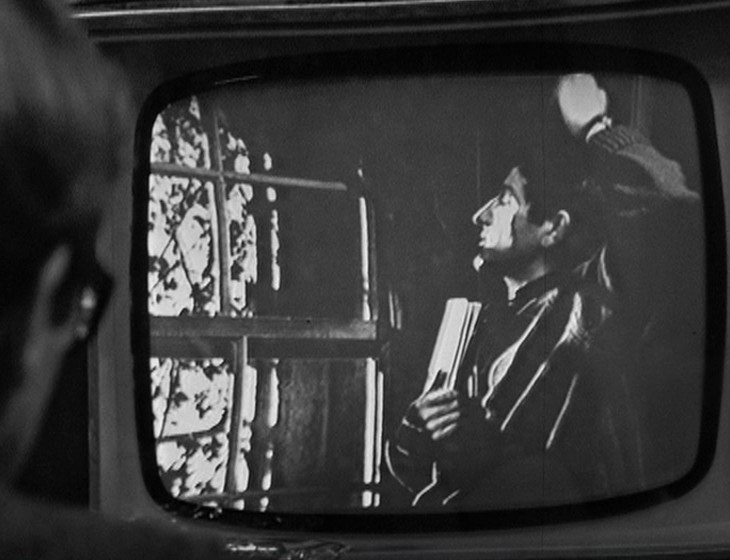
55) And as we reach the climax of the play, we see Nigel on the telly:
NIGEL: Here, books are not regarded as muddles.
NIGEL: Here, books are not regarded as rubbish.
I haven’t highlighted every single change like this one, but I highly enjoy the use of the word “muddles” in this context, so I wish they’d kept it.
56) Harry is annoyed:
HARRY: Watch you like a hawk! Good God alive!
HARRY: Watch you like a hawk, do I?
57) A final blasphemous reference removed:
HARRY: You mightn’t. But I do. By God, I do!
HARRY: Well you might not, but I do. I bloody hope I do!
58) A particuarly interesting change, this one. In the script, when Nigel tells his mother he likes No Hiding Place, the stage direction notes that Nigel “begins to laugh”. This was entirely ignored when it came to staging the thing for real. I think it’s easy to see why this was the case: it would have made Nigel look incredibly heartless, and right at the very end of the play when we’re supposed to have sympathy for him.
24 • Street: Night (1:08:38)
59) And finally, one of the most fascinating changes of all. Here’s the famous end to the play, as scripted:
[They walk away, backs to the camera. Music: ‘We’ve got to get out of this Place’ by The Animals. They walk into the shadows, not quite together. NIGEL looks across at his father, but they are separated by a mutual anxiety.]
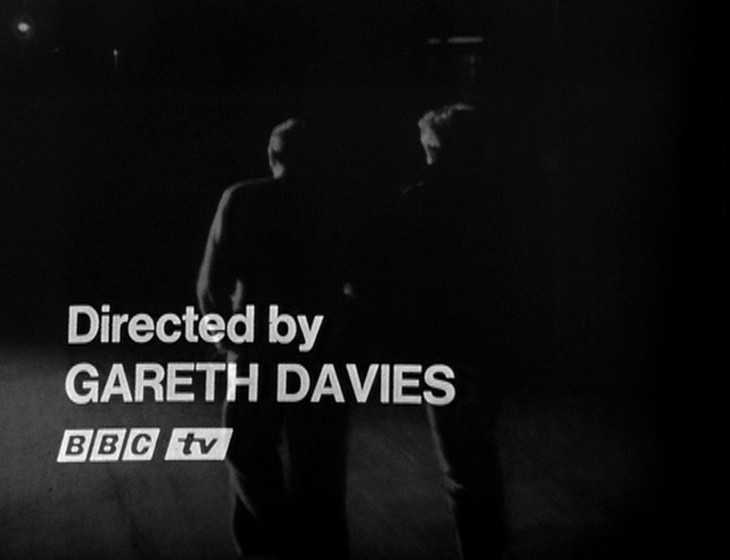
As shot, there’s a distinct difference. Nigel and his father walk together… in the middle of the road, in contrast to the beginning of the play where Nigel dawdles on the pavement. Where the script indicates a lack of resolution, the play as shot indicates hope and a greater understanding between the pair.
Which is, when you think about it, a major change to the play. With just a slightly different choice, the play as broadcast indicates that Nigel and his father have gone on a greater journey than was originally intended. Not a journey where everything is fine at the end, mind… but a journey all the same. In the script, you’d be forgiven for thinking the whole point of the play was that a greater understanding between Nigel and his father was impossible.
And that’s where we leave Nigel for now. Join me next time, as we take a look at the second play, Vote, Vote, Vote for Nigel Barton. And we shall find one approach given to a particular form of censorship is handled quite differently…
Yes, the actual script marks this as Scene 4. The scene numbering is slightly different in the published version of the play. ↩
No, she doesn’t get a first name in the script, either. Sigh. ↩
With thanks to Ian Potter for digging out his copy, as I’ve lost mine. Surely this kind of footnote is the hallmark of every thoroughly-researched article? ↩
